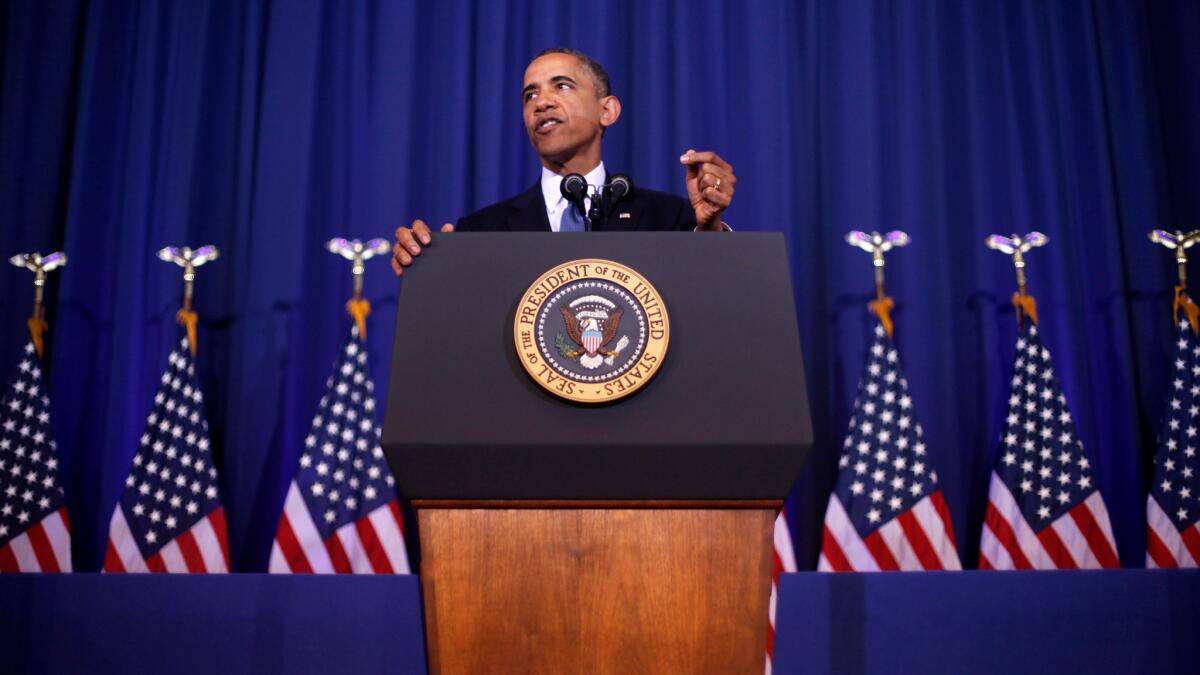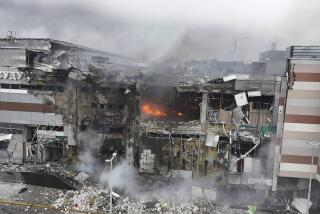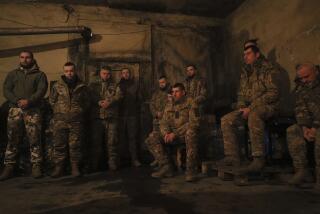Op-Ed: Obama won’t admit it, but the fight against Islamist radicalism will last generations

Until the collapse of the Berlin Wall, most Americans assumed the Cold War would be a permanent fixture of the geopolitical landscape. From Harry Truman onward, every president explained that the confrontation with Soviet communism was generational in scope. In his inaugural address, John F. Kennedy pledged to “bear the burden of a long twilight struggle, year in and year out.” When Ronald Reagan said that his “strategy on the Cold War” was “we win, they lose,” he upset four decades of bipartisan resignation to Soviet hegemony. What most shocked the foreign policy establishment about Reagan was not his militant disdain for the Soviet Union but his sincere conviction that it could actually be defeated.
Over a quarter-century after the Soviet Union’s collapse, we consider that momentous event as having been inevitable. It was not. Many factors contributed to Western victory: a massive military build-up, the resolve of multilateral alliances like NATO, support for third world anti-communist insurgencies, unrelenting dedication to the intellectual cause of human liberty, and the internal weaknesses of communism itself.
All these components pertain to the war against the enemy that attacked the United States on Sept. 11 and continues to wreak havoc everywhere from Istanbul to Raqqa to Paris: Islamist radicalism. Armed support for allies, diplomatic cooperation, gathering human intelligence, and vigorous contestation in the battle of ideas are as much a part of our “long, twilight struggle” against Islamic supremacism as they were tools in the fight against revolutionary Marxist-Leninism. What’s missing today, however, is acknowledgement from the leader of the free world that this war is ongoing, never mind likely to continue for generations.
Elected to office as an anti-war president, Barack Obama seemed to believe that he could wrap up the war on terrorism within two terms. His 2013 speech to the National Defense University was an echo of his predecessor’s ill-timed appearance under a “Mission Accomplished” banner. At NDU, the president declared that “Osama bin Laden is dead, and so are most of his top lieutenants,” adding that “there have been no large-scale attacks on the United States, and our homeland is more secure.”
Less than a year after he delivered this premature coda, however, Islamic State came into being, and no serious analyst can say that America or its allies are safer than they were in 2008 when Obama came to office. Islamic State is a far more sophisticated foe than the Afghan Taliban, whose control of territory in the years leading up to Sept. 11, 2001, provided Al Qaeda with the logistical means to carry out its deadly assault. A series of Islamic State-planned or -inspired terrorist attacks on Western targets, of which the massacre in Orlando is the latest, indicates that as long as Islamic State is a going concern it constitutes a threat to America and its allies.
Obama’s complacency regarding radical Islam ... explains his failed foreign policies.
For the president and his supporters, things weren’t supposed to work out this way. Reducing the American footprint in the Middle East, combined with the very presence in office of a man who grew up in Muslim Indonesia, was supposed to set aright all the damage wrought by George W. Bush. Obama declared the “end” of the Iraq war in 2011, by which he really meant the end of America’s military presence. “The tide of war is receding,” the president declared. Except it didn’t recede. It just continued without us.
Obama’s complacency regarding radical Islam – his failure to see its utter defeat as a necessary and decade-spanning task – explains his failed foreign policies. Because he believed this menace would wither on the vine (helped along by a few drone strikes and conciliatory speeches to Muslim audiences), Obama shrank the defense budget, hastily pulled our troops out of Iraq (where a small contingent should have remained as a stabilizing force as they still do in Germany and South Korea, 70 years after conflicts in those countries were decisively won), and sat on the sidelines as Syria descended into hell. Obama’s obsessive focus on the Israeli-Palestinian conflict, which has remained irresolvable for nearly seven decades without negatively affecting the region’s broader political stability, indicates a naïve belief that the lack of a 23rd Arab state, and not the breakdown of the Middle Eastern state-structure into sectarian bloodletting, is the root cause of the Islamic world’s problems.
Obama’s conviction that we are fighting just a few bad apples and not a world-encompassing, theologically-motivated enemy claiming millions of adherents, also illuminates the controversy du jour: his terminological reticence in uttering “radical Islam.” For to do that would implicitly acknowledge the gravity of the threat, inherently connected to the religion of Islam.
“This war, like all wars, must end,” Obama declared in 2013. It should not surprise us that a president who places so much stock in the power of his own voice would fail to understand that saying something doesn’t make it so.
James Kirchick is filling in for Doyle McManus. He is a fellow with the Foreign Policy Initiative. Follow him on Twitter @jkirchick.
Follow the Opinion section on Twitter @latimesopinion or Facebook
More to Read
A cure for the common opinion
Get thought-provoking perspectives with our weekly newsletter.
You may occasionally receive promotional content from the Los Angeles Times.






